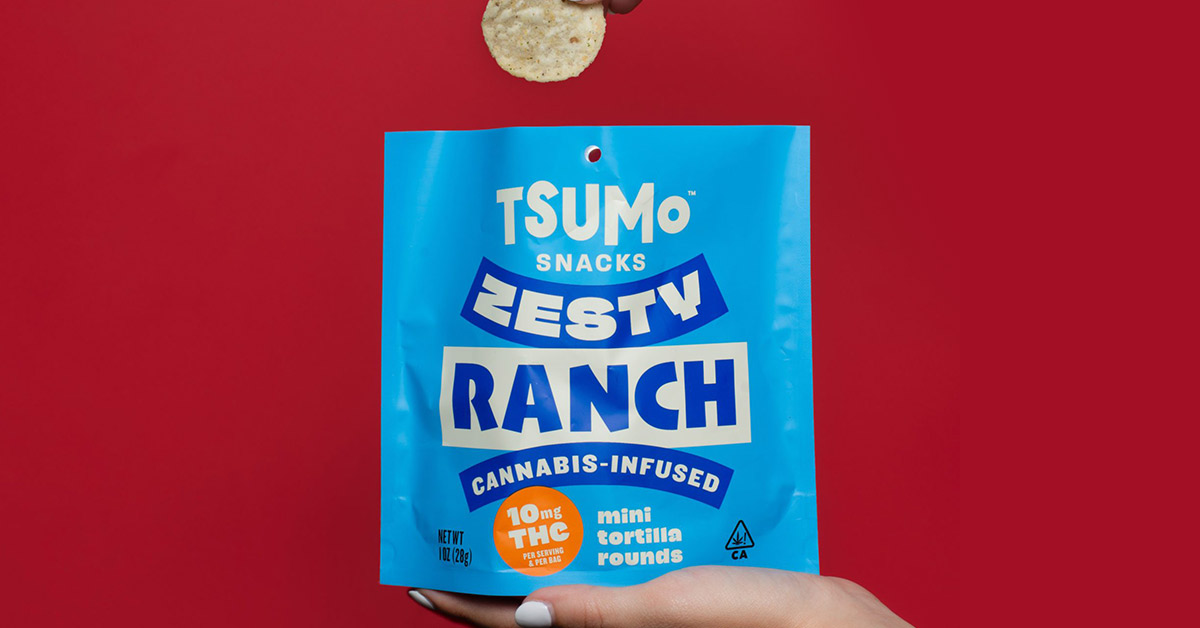TSUMo Snacks to Go from THC to Hemp Brand After CEO Exit

After the exit of co-founder and CEO Caroline Yeh this summer, cannabis-infused food brand TSUMo Snacks is now aiming to retool and relaunch in the mainstream marketplace as a hemp-based Delta-9 THC product.
Yeh announced on LinkedIn earlier this month that she had left TSUMo Snacks at the end of August after 2 1/2 years with the brand, citing difficulties within the regulated cannabis marketplace as a core reason behind the company’s decision to go into hibernation and lay off staff earlier this year.
TSUMo was founded in 2020 and is run by Redbud Brands, a CPG venture studio created by beverage entrepreneur and CEO Brian Goldberg and operating partner John Ferrari. Last year, Redbud raised a $46 million funding round, backed by investment firms including Satori Capital, Sands Capital, and VMG Partners.
TSUMo, which operates via a separate holding company from Redbud in order to allow only select investors to be involved with a cannabis business, was one of several brands launched within Redbud’s incubation unit.
The brand originally produced a line of salty and savory THC-infused snacks, including flavored Tortilla Rounds, Tortilla Strips and Cheese Crunchers. Focused on the California cannabis dispensary channel, TSUMo’s products contain a total 100 mg of THC across 10 servings per 4 oz. bag. The brand had also struck up partnerships with celebrities like chef Roy Choi and rapper Snoop Dogg, who also invested in the business through his VC firm Casa Verde Capital.
In 2021, TSUMo raised a $4 million seed round of funding and according to Yeh the brand benefited from Redbud’s supply chain connections which helped it to establish manufacturing, which can be difficult to come by in the edibles category as many CPG co-packers are unfamiliar or unwilling to work with THC.
Despite operational challenges, Yeh said TSUMo had been doing well in the market and cited data from Headset showing it was dominating the salty and savory cannabis snacks category in terms of share.
However, the intricacies of the regulated cannabis marketplace, combined with last year’s high inflation, proved to be too much for TSUMo to navigate. Yeh said the company was constantly fighting to receive payment for the products it sold, an issue she discussed in a LinkedIn post this summer. She noted that slow payback from retailers to distributors and in turn distributors to brands is a common problem within the California dispensary channel, and it led to an average 90 to 120 days waiting period to get paid, she said, often leaving TSUMo with insufficient working capital.
By May this year, a decision was made by leadership at Redbud and Casa Verde to transition TSUMo out of the regulated cannabis market and lay off staff, leaving just Yeh and one other full time team member to lead sales. By August, the firms opted to also terminate Yeh and the other remaining employee and place the brand into hibernation mode in order to retool the business.
“Looking at the retail numbers [we] were doing really well,” Yeh said. “So it wasn’t that we didn’t have business, and that we didn’t have loyal customers interested in the products, but on an operational level you just can’t keep operating without cash, which was always the case with the business.”
While remaining inventory is still being sold through the California dispensary channel, TSUMo is currently in a holding pattern and new cannabis-infused products are not being produced.
In the LinkedIn post announcing her departure this month, Yeh initially misstated that TSUMo was in the process of winding down. But in an edited version of the post, she wrote that she was “threatened with legal action by two different parties” over her initial statements and removed references to the brand closing.
Speaking by phone, John Ferrari called the mistake “unfortunate” and said Redbud will aim to be clearer about the directions of its portfolio brands.
“We’re going to try to do a better job of just being thoughtful about how we communicate when things are not working,” he added. “But that is the nature of what we do, we create companies at the riskiest possible stage.”
Ferrari echoed Yeh’s frustrations with the regulated cannabis market, and similarly cited a lack of payments from dispensaries as one of the top issues leading to the brand’s pivot, alongside other common cannabis industry headaches like restrictions on cross-state distribution.
He added that although he “loved working with her,” the studio opted to let Yeh go amid the brand’s restructuring because much of her business experience had been in the THC market; she previously worked at brands like Kiva Confections and Bloom Farms.
Goldberg added that it was also necessary to reduce salary expenses during the transition period.
“Tsumo needed to cut costs while transitioning the business to a more scalable model,” Goldberg said via email. “Caroline worked hard to build the brand in a tough market environment and it’s unfortunate we had to part ways given the challenging state of the market.”
Redbud is now seeking an executive with more experience in the mainstream salty snacks category to lead the business. Although prior to entering the cannabis sector, Yeh did previously serve as director of products at Indian foods brand Bandar Foods and as operations manager at 479 Popcorn from 2009 to 2012.
Ferrari said TSUMo is now working on a pilot program with a strategic partner capable of servicing up to 200,000 doors and may look to recapitalize the business and hire a new executive to lead it depending on the results of that test run.
















